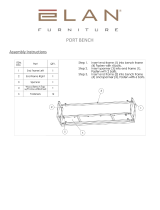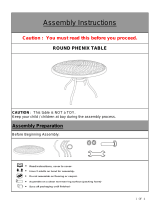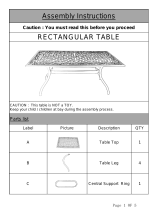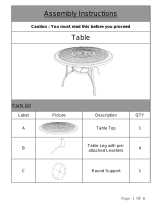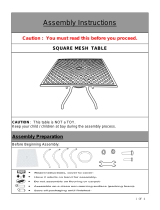Page is loading ...

PRT
ORIGINAL
INSTRUCTIONS
Please read these instructions before use.
Failure to follow the warnings and instructions may
result in electric shock, fire and/or serious injury.

PRT
Dear Customer
Thank you for purchasing this Trend product,
we hope you enjoy many years of creative and
productive use.
Please remember to return your guarantee card
within 28 days of purchase.
CONTENTS
TECHNICAL DATA ____________________ 1
SAFETY ___________________________ 2-3
ELECTRICAL SAFETY ________________ 4
EC DECLARATION OF CONFORMITY ____ 5
ITEMS ENCLOSED ____________________ 6
DESCRIPTION OF PARTS ______________ 7
ASSEMBLY
– Fitting Legs _________________________ 8
– Router Compatibility __________________ 9
– Mounting Router to Insert Plate ________ 10
– Fitting Insert Rings _________________ 11
– Fitting Back Fence _________________ 12
– Fitting Top Guard & Top Pressure ______ 13
– Fitting Side Pressure ________________ 14
– Fitting Mitre Fence __________________ 15
– Fitting Dust Extraction Hose ___________ 16
OPERATION
– No-Volt Release Switch _____________ 17
– Back Fence Adjustment ______________ 18
– Edge Moulding and Grooving __________ 19
– Stopped Moulding __________________ 20
– Mitre Fence & Lead on Pin _________ 21-22
ACCESSORIES _____________________ 23
MAINTENANCE ____________________ 24
ENVIRONMENTAL PROTECTION ______ 24
GUARANTEE _______________________ 24
SPARE PARTS
– Spare Parts List __________________ 25-26
– Spare Parts Diagram ______________ 27-28
Please read these instructions before use.
Definitions: Safety Guidelines
The definitions below describe the level of
severity for each signal word. Please read the
manual and pay attention to these symbols.
The following symbols are used throughout this
manual:
WARNING: indicates a potentially
hazardous situation which, if not avoided,
could result in death or serious injury.
CAUTION: Indicates a potentially
hazardous situation which, if not avoided,
may result in minor or moderate injury.
NOTICE: Indicates a practice not related to
personal injury which, if not avoided, may
result in property damage.
Denotes risk of electric shock.
Denotes risk of fire.
Additional Symbols Used
Wear Personal Protective Equipment
(PPE). Ear, eye and respiratory
protection must be worn.
Denotes risk of personal injury, loss of
life or damage to the tool in case or
non-observance of the instructions in this
manual.
Refer to the instruction
manual of your power tool.
☎
If you require further safety advice,
technical information or spare parts,
please call Trend Technical Support
or visit www.trend-uk.com

PRT
-1-
Voltage UK & Eire V
AC
230/115
Europe V
AC
230
On/off switch No-volt
Release
Dimensions Width x mm 650 x 550
depth
Height with mm 860
legs
Bench height mm 350
Cutter diameter height max. mm 75
Cutter length max. mm 70
Loss of cutting mm 8
depth due to
table thickness
Workpiece height max. mm 57
Workpiece length max.* mm 600
Weight kg 26.2
ROUTER TABLE
PRT
TECHNICAL DATA
INTENDED USE
The unit is intended for stationary operation of
portable routers for the cutting of wood or wood
based material when suitable cutter is fitted.
It is not intended for continuous production or
production line use.
This unit must not be put into service until it
has been established that the power tool to
be connected to this unit is compliance with
2006/42/EC (identified by the CE marking on the
power tool).
This router table is a professional product.
DO NOT use under wet conditions or in presence
of flammable liquids or gases.
DO NOT let children come into contact with
this appliance. Supervision is required when
inexperienced operators use this appliance.
This product is not intended for use by persons
(including children) suffering from diminished
physical, sensory or mental abilities ; lack of
experience, knowledge or skills unless they are
supervised by a person responsible for their
safety. Children should never be left alone with
this product.
UK & Eire 230V tools 13 Amperes, in plug
UK & Eire 115V tools 16 Amperes, in mains
Europe 230V tools 10 Amperes, in mains
Fuses
*Unless a workpiece support is used.

PRT
-2-
SAFETY
WARNING:
Observe the safety regulations in the
instruction manual of the power tool
to be used. Please read the following
instructions carefully. Failure to do so
could lead to serious injury. When using
electric tools, basic safety precautions,
including the following should always be
followed to reduce the risk of fire, electric
shock and personal injury. Also observe
any applicable additional safety rules.
Read the following safety instructions
before attempting to operate this product.
PLEASE KEEP THESE
INSTRUCTIONS IN A SAFE PLACE.
The attention of UK users is drawn to The
Provision and Use of Work Equipment
Regulations 1998, and any subsequent
amendments.
Users should also read the HSE/HSC
Safe Use of Woodworking Machinery
Approved Code of Practice and Guidance
Document and any amendments.
Users must be competent with
woodworking equipment before using our
products.
IMPORTANT NOTE:
Residual Risk. Although the safety
instructions and operating manuals for
our tools contain extensive instructions
on safe working with power tools, every
power tool involves a certain residual risk
which cannot be completely excluded
by safety mechanisms. Power tools
must therefore always be operated with
caution!
General
1. Disconnect power tool and attachment
from power supply when not in
use, before servicing, when making
adjustments and when changing
accessories such as cutters. Ensure
switch is in “off” position. Always
ensure cutter has stopped rotating.
2. Always mount the power tool,
accessory or attachment in conformity
with the instructions. Only use
attachment and accessories specified
in the power tool manual. The tool or
attachment should not be modified or
used for any application other than
that for which it was designed. Do not
force tool.
3. Keep children and visitors away. Do
not let children or visitors touch the
tool, accessory or attachment. Keep
children and visitors away from work
area. Make the workshop child proof
with padlock and master switch.
4. Dress properly. Do not wear loose
clothing or jewellery, they can be
caught in moving parts. Rubber
gloves and non-skid footwear
is recommended when working
outdoors. Wear protective hair
covering to contain long hair.
5. Consider working environment. Do
not use the product in the rain or in
a damp environment. Keep work
area well lit. Do not use power tools
near gasoline or flammable liquids.
Keep workshop at a comfortable
temperature so your hands are not
cold. Connect machines that are
used in the open via a residual current
device (RCD) with an actuation
current of 30 mA maximum. Use only
extension cables that are approved for
outdoor use.
6. The accessory or attachment must be
kept level and stable at all times.
7. Keep work area clean. Cluttered
workshops and benches can cause
injuries. Ensure there is sufficient
room to work safely.
8. Secure idle tools. When not in use,
tools should be stored in a dry and
high or locked up place, out of reach
of children.
9. For best control and safety use
both hands on the power tool and
attachment. Keep both hands away
from cutting area. Always wait for the
spindle and cutter to stop rotating
before making any adjustments.
10. Always keep guards in place and in
good working order.
11. Remove any nails, staples and other
metal parts from the workpiece.
12. Maintain tools and cutters with care.
Keep cutters sharp and clean for
better and safer performance. Do
not use damaged cutters. Follow
instructions for lubricating and
changing accessories. Keep handles
dry, clean and free from oil and
grease.
13. Maintain accessories. Do not use
damaged accessories. Only use
accessories recommended by the
manufacturer.
14. Check damaged parts. Before
operation inspect the attachment,
the power tool, the cable, extension
cable and the plug carefully for signs
of damage. Check for alignment of
moving parts, binding, breakage,
mounting and any other conditions
that may effect its operation. Have any
damage repaired by an Authorised
Service Agent before using the tool or
accessory. Protect tools from impact
and shock.
15. Do not use tool if switch does not turn
it on or off. Have defective switches
replaced by an Authorised Service
Agent.
16. Don’t over reach. Keep proper footing
and balance at all times. Do not
use awkward or uncomfortable hand
positions.
17. Don’t abuse the cable.Never carry
power tool or accessory by cord or
pull it to disconnect from the socket.
Keep cord from heat, oil and sharp
edges. Always trail the power cord
away from the work area.
18. Connect dust extraction equipment.
If devices are provided for the
connection of dust extraction and
collection facilities, ensure these are
connected and properly used.
19. Check all fixing and fastening nuts,
bolts and screws on power tool,
attachment and cutting tools before
use to ensure they are tight and
secure. Periodically check when
machining over long periods.
20. Stay alert. Watch what you are doing.
Use common sense. Do not operate
tools when you are tired, under the
influence of drugs or alcohol.
21. Personal Protective Equipment (PPE)
for eye, ear and respiratory protection
must be worn. All PPE must meet
current UK and EU legislation.
22. Do not leave tools running
unattended. Do not leave tool until it
comes to a complete stop.
23. Always clamp workpiece being
machined securely.
24. Only use cutting tools for
woodworking that meet EN847-
1/2 safety standards, and any
subsequent amendments.
25. Vibration levels. Hand held power
tools produce different vibration
levels. You should always refer to
the specifications and relevant Health
& Safety Guide.
Routing Safety
1. Read and understand instructions
supplied with power tool, attachment
and cutter.
2. Keep hands, hair and clothing clear of
the cutter.
3. Remove adjusting keys and
spanners. Check to see that keys
and adjusting spanners are removed
from the router tool, cutter and
attachment before turning router on.
Make sure cutter can rotate freely.
4. Noise. Take appropriate measures
for the protection of hearing if
the sound pressure of 85dB(A) is
exceeded. Routing sound pressure
may exceed 85dB(A), so ear
protection must be worn.
5. Eye protection. Always wear eye
protection in the form of safety
goggles, spectacles or visors to
protect the eyes.
6. Respiratory protection. Always wear
a face or dust mask, or powered
respirator. Dust masks/filters should
be changed regularly.
7. Do not switch router on with the cutter
touching the workpiece. At the end of
the cut, release the router plunge and
allow spindle to stop rotating. Never
use the spindle lock as a brake

PRT
-3-
PRT
-3-
8. The direction of routing must always
be opposite to the cutter’s direction of
rotation. Do not back-cut or climb-cut.
9. Check before cutting that there are
no obstructions in the path of the
router. Ensure there are no obstacles
beneath workpiece when cutting full
thickness, and that a sacrificial work
surface is used.
10.Hold power tool by insulated gripping
surfaces, because the cutter may
contact its own cord. Cutting the “live”
wire may make exposed metal parts
of the powertool “live” and shock the
operator.
11.Use clamps or another practical way
to secure and support the workpiece
to a stable platform. Holding the work
by your hand or against the body
leaves it unstable and may lead to
loss of control.
Router Cutter Safety
1. Cutting tools are sharp. Care should
be taken when handling them. Do not
drop cutters or knock them against
hard objects. Handle very small
diameter cutters with extra care.
Always return cutter to its packaging
after use.
2. Always use cutters with a shank
diameter corresponding to the size of
the collet installed in your tool.
3. The maximum speed (n.max) marked
on the tool, or in instructions or on
packaging shall not be exceeded.
Where stated the speed range shall
be adhered to. Recommended speeds
are shown in the Trend Routing
Catalogue and/or website.
4. Always use router cutters in a router.
Drill and boring bits must not be
used in a router. Router cutters
must only be used for the material
cutting application for which they are
designed. Do not use on metal or
masonry.
5. Never use cutters with a diameter
exceeding the maximum diameter
indicated in the technical data of the
powertool or attachment used.
6. Before each use check that the
cutting tool is sharp and free from
damage. Do not use the cutting tool
if it is dull, broken or cracked or if in
any other damage is noticeable or
suspected.
7. Cutters should be kept clean. Resin
build up should be removed at regular
intervals with Resin Cleaner. The use
of a PTFE dry lubricant will reduce
resin build up. Do not use PTFE spray
on plastic parts.
8. When using stacked tooling (multi-
blade, block and groover etc.) on a
spindle arbor, ensure that the cutting
edges are staggered to each other to
reduce the cutting impact.
9. Cutter shanks should be inserted
into the collet all the way to the line
indicated on the shank. This ensures
that at least
3
⁄
4
of the shank length
is held in the collet. Ensure clamping
surfaces are cleaned to remove dirt,
grease, oil and water.
10. Observe the correct assembly and
fitting instructions in the router
instruction manual for fitting the collet,
nut and cutter.
11. Tool and tool bodies shall be clamped
in such a way that they will not
become loose during operation. Care
shall be taken when mounting cutting
tools to ensure that the clamping is by
the shank of the cutting tool and that
the cutting edges are not in contact
with each other or with the clamping
elements.
12. It is advisable to periodically check
the collet and collet nut. A damaged,
worn or distorted collet and nut can
cause vibration and shank damage.
Do not over-tighten the collet nut
13. Do not take deep cuts in one pass;
take several shallow or light passes
to reduce the side load applied to the
cutter and router. Too deep a cut in
one pass can stall the router.
14. In case of excessive vibrations whilst
using the router stop immediately and
have the eccentricity of the router,
router cutter and clamping system
checked by competent personnel
15. All fastening screws and nuts should
be tightened using the appropriate
spanner or key and to the torque
value provided by the manufacturer.
16. Extension of the spanner or tightening
using hammer blows shall not be
permitted.
17. Clamping screws shall be tightened
according to instructions provided by
the manufacture. Where instructions
are not provided, clamping screws
shall be tightened in sequence from
the centre outwards.
18. Do not touch the cutter immediately
after operation; it may be extremely
hot and could burn your skin.
Using Routers In A Fixed Position
1. Attention should be made to the
HSE’s Safe Use of Vertical Spindle
Moulding Machines Information Sheet
No.18 and any revisions.
2. After work, release the router plunge
to protect the cutter.
3. Always use a push-stick or push-
block when making any cut less than
300mm in length or when feeding the
last 300mm of the cut.
4. The opening around the cutter should
be reduced to a minimum using
suitably sized insert rings in the table
and closing the back fence cheeks or
fitting a false fence on the back fence.
5. Whenever possible use a work
holding device or jig to secure
component being machined. Ensure
any attachment is securely fitted to
the workbench, with table surface at
approximately hip height.
6. Use a No-Volt Release Switch. Ensure
it is fixed securely, easily accessible
and used correctly.
7. In router table (inverted) mode, stand
to the front right of the table. The
cutter will rotate anti-clockwise when
viewed from top so the feed direction
is from the right (against the rotation of
the cutter). In overhead mode, stand to
the front left of the machine table and
the feed direction is from the left.
8. Do not reach underneath table or put
your hands or fingers at any time in
the cutting path while tool is connected
to a power supply.
9. Never thickness timber between the
back of the cutter and the backfence.
Useful Advice When Routing
1. Judge your feed rate by the sound
of the motor. Feed the router at a
constant feed rate. Too slow a feed
rate will result in burning.
2. Trial cuts should be made on waste
material before starting any project.
3. When using some attachments e.g.
a router table or dovetail jig, a fine
height adjuster is recommended.
4. When using a template guide bush,
ensure there is sufficient clearance
between cutter tip and inside edge
of bush and that it cannot come into
contact with collet and nut. Ensure
cutter and guide bush are concentric.
Router Cutter Repair/Maintenance
1. Repair of tools is only allowed in
accordance with the manufacturers
instructions.
2. The design of composite (tipped)
tools shall not be changed in process
of repair. Composite tools shall be
repaired by a competent person i.e.
a person of training and experience,
who has knowledge of the design
requirements and understands the
levels of safety to be achieved.
3. Repair shall therefore include, e.g.
the use of spare parts which are in
accordance with the specification
of the original parts provided by the
manufacturer.
4. Tolerances which ensure correct
clamping shall be maintained.
5. Care shall be taken that regrinding
of the cutting edge will not cause
weakening of the body and the
connection of the cutting edge to the
body.
Version 8.0 08/2017

PRT
-4-
Mains Plug Replacement
(UK & Ireland only)
Always check the condition of the cable and plug
before starting with your work.
Should your mains plug need replacing and you
are competent to do this, proceed as instructed
below. If you are in doubt, contact an authorised
Trend repair agent or a qualified electrician.
■ Disconnect the plug from the supply.
■ Cut off the plug and dispose of it safely;
a plug with bared copper conductors is
dangerous if engaged in a live socket outlet.
■ Only fit 13 Amperes BS 1363A approved
plugs fitted with a 13 Amp A.S.T.A approved
BS 1362 fuse (1).
■ The cable wire colours, or a letter, will be
marked at the connection points of most
good quality plugs. Attach the wires to their
respective points in the plug (see below).
Brown is for Live (L) (2) and Blue is for
Neutral (N) (3).
■ Before replacing the top cover of the mains
plug ensure that the cable restraint (4) is
holding the outer sheath of the cable firmly
and that the two leads are correctly fixed at
the terminal screws.
For 115V units with a power rating exceeding
1500W, we recommend to use a plug to BS4343
standard.
NOTICE: 115v routers over 13.5A including
T10ELK & T11ELK cannot be used with the
PRT/L (115v).
ELECTRICAL SAFETY
3
4
2
1
13 AMP
Using an Extension Cable
■ If an extension cable is required, use an
approved triple core extension cable suitable
for the power input of this tool (see technical
data). The minimum conductor size is 1.5mm
2
.
■ When using a cable reel, always unwind the
cable completely.
■ Also refer to the table below.
Conductor size (mm
2
) Cable rating (Amperes)
0.75 6
1.00 10
1.50 15
2.50 20
4.00 25
Cable length (m)
7.5 15 25 30 45 60
Voltage Amperes Cable rating (Amperes
115 0 - 2.0 6 6 6 6 6 10
2.1 - 3.4 6 6 6 6 15 15
3.5 - 5.0 6 6 10 15 20 20
5.1 - 7.0 10 10 15 20 20 25
7.1 - 12.0 15 15 20 25 25 -
12.1 - 20.0 20 20 25 - - -
230 0 - 2.0 6 6 6 6 6 6
2.1 - 3.4 6 6 6 6 6
6
3.5 - 5.0 6 6 6 6 10 15
5.1 - 7.0 10 10 10 10 15 15
7.1 - 12.0 15 15 15 15 20 20
12.1 - 20.0 20 20 20 20 25 -
WARNING: Never use a light socket.
Never connect the live (L) or neutral (N)
wires to the earth pin marked E or .

EC DECLARATION OF
CONFORMITY
MACHINERY DIRECTIVE
ROUTER TABLE
PRT
Trend declares that the attachment described
under Technical Data is in compliance with
2006/42/EC and has been designed in
accordance with IEC 62841-1.
This product also complies with Directive
2014/35/EU.
Pushstick is made in compliance with
Harmonized Standard EN 1870-19:2013.
For more information please contact Trend at the
following address or refer to back of manual.
The undersigned make this declaration on behalf
of Trend Machinery & Cutting Tools Ltd
Technical Director
Neil McMillan
Trend Machinery & Cutting Tools Ltd
Unit 6 Odhams Trading Estate
St Albans Road, Watford
Herts, WD24 7TR
United Kingdom
01.01.2018
RESIDUAL RISKS
In spite of the application of the relevant safety
regulations and implementation of safety devices,
certain residual risks cannot be avoided. These
are:-
■ Impairment of hearing.
■ Risk of personal injury due to flying particles.
■ Risk of burns due to accessories becoming
hot during operation.
■ Risk of personal injury due to prolonged use
PRT
-5-
MARKINGS ON TABLE
The following pictures are shown on the
tool.
Read instruction manual before use.
Date Code Position
The year of manufacture is on a label next to the
rating plate.
■ Pozi
®
No.2. screwdriver.
■ Router.
■ Hand tools.
■ Spanner 8mm A/F for mitre fence.
■ Slotted screwdriver for lead on pin.
■ Check for damage to the tool, parts or
accessories which may have occurred
during transport.
■ Take the time to thoroughly read and
understand this manual prior to operation.
ITEMS ENCLOSED

PRT
-6-
ITEMS
ENCLOSED
PRT
GUARANTEE
PRT
x1
x1
x1
x1
x1
x1
x4
x1
x1
x1
x1
x2
x1
x1
x1
x1
x4
x1
x1
x3
x3

PRT
-7-
-7-
G
J
C
H
A
L
W
R
K
B
N
Q
M
U
I
F
O
Z
V
D
E
S
T
P
Y
X
AA
X
Table top
Insert rings
Back fence
Scale
Dust port
Side pressure guard
Top pressure guard
Fence cheek
Guard
Pivot guard lock
Floor legs
Bench legs
Lead on pin
Router trigger lock
strap
Mitre fence
Lead on pin park
Pushstick
Mitre fence slot
Back fence slots/keyhole
Push stick park
Router clamping screws
Lead on pin location hole
No volt release switch
Back fence vertical
adjuster assembly
Back fence locking
knob and bolt
Mitre fence false cheek
fixing screws
Bench leg adjustment
foot
DESCRIPTION OF PARTS
A
B
C
D
E
F
G
H
I
J
K
L
M
N
O
P
Q
R
S
T
U
V
W
X
Y
Z
AA

PRT
-8-
ASSEMBLY
Fitting Legs
3
4
1
2
WARNING: Prior to assembly
and adjustments always unplug
the router table.
The router table does not need to
be secured to the floor or bench.

PRT
-9-
Make Router Model Screw x Qty
TREND T3, T4, T5 B X 2
TREND T10◆, T11◆ B X 3
CMT CMT1E B X 3
DEWALT DW613, 614, 615 B X 2
DEWALT DW624, 625E B X 3
ELU MOF96(E) MK2. B X 2
ELU MOF131, 177(E) Mk2 B X 3
PERLES OF808(E) >1999 B X 2
Router Compatibility See machine screw illustrations on next page.
Three machine screws (B) are supplied as standard with the PRT table.
NOTICE: Do not mount any power
tools not specified on this list.
115v routers over 13.5A cannot
be used with the PRT/L (115v).
◆Not 115v.
Mounting Router to Middle Extension
Invert and stand your router onto a suitable
surface. Remove middle extrusion from table by
turning cam locks by using a slotted screwdriver
and place it facing upwards onto the base of
your router use slotted screwdriver. Screws are
supplied for TBC routers.

PRT
-10-
Re-drilling Router Base Only
■ Invert and stand your router onto a suitable
surface.
■ Remove middle extrusion from table by
turning cam locks and place it facing upwards
onto the base of your router.
■ Adjust position of the middle extrusion to
centralise.
■ Ensure that the holes you are about to drill
in the base do not interfere with any of the
features on the router or any webbings in the
casting of the router base. A slight turning
of the router may be required to miss such
obstructions.
For Non Trend Routers
For users who choose to fit other makes and
models of router, the router base plate and/or
middles extrusion will need to be re-drilled by
the user and fixing kit accessory Ref. FIX/KIT/2
is required. Please see our website for further
details.
Where possible it is advisable to use the existing
countersunk holes for M6 machine screws in the
middles extension and drill corresponding holes
in the router base plate. The router is then fitted
using the M6 machine screws, washers and nuts
(C or D, see below).
For some machines M5 screws machine screws
(A) can be used to fit into the M5 holes in the
router base.
■ Mark the centre of the holes onto the base.
■ Remove middle extrusion and mark the centre of
the holes with a centre punch.
■ Drill a 6mm diameter hole at these points.
■ Clean up edges of holes if required.
Re-drilling Middle Extrusion Only
■ Remove middle extrusion from table by turning
cam locks.
■ Remove the plastic base of the router.
Alternatively a photocopy or an outline of the base
can be made of the plastic base instead.
■ Align the centre of the middle extrusion to the
router base and secure them together.
■ Using a centre punch, mark the centres of holes.
■ Drill the required hole size with a suitable metal
cutting drill bit. Best results will be obtained if
your power drill is mounted in a drill stand.
■ Countersink the hole with a countersink bit to
a depth so the heads of the screws are slightly
below the top surface. Clean off any burrs.
Re-drilling both Middle Extrusion
and Router Base
■ Invert the router and lay the middle extrusion onto
the upturned base.
■ Clamp the middle extrusion and router base
together with two cramps.
■ Ensuring that the drill bit will not foul any webbing
or fixtures on the router base, drill with a 6mm
diameter metal cutting drill bit into the middle
extrusion and through the router base two holes.
■ Unclamp the router base and middle extrusion.
■ Countersink the middle extrusion holes with a
countersink bit to a depth so the screw heads are
slightly below the top surface. Clean off any burrs
created on both the middle extrusion and router base.
CAUTION: Ensure working position
is comfortable. If placing on a
workbench ensure workbench is
stable and secure.
Ref. FIX/KIT/2
Screw Countersink Hole
size diameter diameter
M6 13mm 6mm
M5 10mm 5mm
Countersink Hole Size

PRT
-11-
2
1
1
2
SCALE 1:1
20mm
16mm
=
35mm
31mm
=
54mm
50mm
=
72mm
68mm
=
90mm
75mm
=
WARNING: Always ensure insert rings
are a tight fit in the insert plate.
Replace damaged or loose rings
immediately.

PRT
-12-
Fitting Back Fence
Back Fence Vertical Adjustment
2
2
1
1
2
1
Use a slotted screwdriver.

PRT
-13-
Fitting Top Guard & Top Pressure
SCALE
1:1
1
2
SCALE 1:1
5mm
max.
SCALE 1:1
SCALE 1:1
10mm
max.
SCALE 1:1
5mm
max.
SCALE 1:1
SCALE 1:1
10mm
max.

PRT
-14--14-
Fitting Side Pressure
S
C
A
L
E
1
:
1
5mm
Position 1
Position 2
Position 3
70mm

PRT
-15-
Fitting Mitre Fence
Bench Leg Foot Adjustment
S
C
A
L
E
2
1
Position 1
Mitre Fence Adjustment
Preset mitre fence angles can be zeroed by
loosening the lock nuts on the underside of the
protractor using an 8mm A/F spanner, and adjusting
the screws using a Pozi
®
No.2. screwdriver.
Once set tighten the nuts with an 8mm A/F spanner.
The back left bench leg has
a height adjustment facility.

PRT
-16-
CRT/4
57mmø
Fitting Dust Extraction Hose
Accessory Ref. CRT/4
(not included)

PRT
-17-
OPERATION
■ Plug machine into
trailing socket.
■ Put plug of switch
into mains supply.
■ Switch on router
■ Press green button to
switch on. To switch off
press red button.
No-Volt Release
Switch
S
C
A
L
E
WARNING: Isolate
from power supply
when making any
adjustments.
ON
OFF

PRT
-18-
Back Fence
Adjustment
3mm
max.
3mm
max.
3mm
max.
3mm
max.
■ Adjust back fence
position by loosening
two knobs (A) and
pushing fence
forwards or
backwards.
■ Lock fence position
by tightening the two
knobs (A).
■ To adjust fence
cheeks loosen
four back
knobs (B). Slide
cheeks in and
out to suit cutter.
Leave gap of
3mm.
■ Lock cheeks by
tightening four
knobs (B).
A
A
B
A
3mm
max.
3mm
max.
Max 121mm Position 4
Max 84mm Position 3
Max 43mm Position 2
Max 10mm Position 1
Pushstick Operation
The pushstick has been designed for use with a
router table, and should always be used when
making any cut less than 300mm in length or,
when feeding the last 300mm of a longer cut.
The birds mouth is 90° and should be angled at
between 20° to 30° to the workpiece to suit the
height of the machinist.
CAUTION: Compliance with the safety
requirements of the regulations in
force is nullified by any modification
or tampering with the pushstick.
90°
20°-30°
CAUTION: Do not use the pushstick as
a lever or for uses other than those
envisaged.
/
